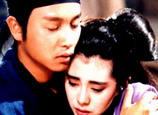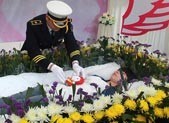
NANCHANG, Apr. 1 (Xinhua) -- Xiong Junhui stood silently for a few minutes in front of the gravestone where his 12-year-old son is buried early Friday morning, tears streaming down his face the moment he touched a portrait of his son.
Xiong, 43, a laid-off worker in the city of Yingtan in east China's Jiangxi Province, decided to donate his son's kidney and liver after the 12-year-old died of a spontaneous intracerebral hemorrhage in December last year.
"Even though I felt heartbroken when I lost my son, I feel a little bit relieved that his life can be extended in another way," Xiong said.
However, the father didn't tell his father and parents-in-law about the situation until after little Xiong's organs had been donated. Older Chinese are generally opposed to the practice.
"They didn't talk to me for several days," Xiong said.
Xiong's decision also surprised his neighbors, as traditional Chinese customs call for people to be buried or cremated with their organs intact.
"Xiong's determination to donate his son's organs saved three lives," said Dai Ying, secretary-general of the Jiangxi branch of the Red Cross Society of China (RCSC).
Xiong and many others gathered to pay tribute to the deceased in the Qingshan Cemetery in Nanchang, capital of Jiangxi, less than a week ahead of Tomb-Sweeping Day. The holiday, which falls on April 4 this year, calls for honoring the memory of one's deceased loved ones.
In order to raise public awareness of the importance of organ donation and discourage the black market trading of organs, the former Ministry of Health (MOH) and the RCSC jointly initiated a project to promote donations in March 2010. The project has been extended to 19 provinces and municipalities.
In Jiangxi alone, a total of 112 cornea donations have been recorded, helping more than 200 patients recover their sight, according to statistics from the Jiangxi branch of the RCSC.
As many as 1,125 volunteers in the province have registered to donate their organs after they pass away, according to the branch.
"A full-body donation can cure nearly 100 patients via tissue or organ transplants, while a pair of corneas alone can help six to eight patients with eye diseases recover," said Dai.
"A total of 1,804 organ donations have been recorded since the trial project started three years ago, with an increasing number of voluntary organ donations," according to the RCSC.
Relevant regulations on human organ donations have been enacted by local legislatures, including the provinces of Jiangxi and Fujian, as well as Shanghai and Tianjin municipalities.
The Human Body Donation Regulation was enacted by local legislatures in Jiangxi Province and north China's Tianjin Municipality at their annual sessions held earlier this year. The regulation came into effect on March 1.
According to the regulation, the immediate relatives of a person can make donation decisions if the deceased has not stated before death whether or not his or her body can be donated. If a person requests that his or her organs be donated after death, the relatives are not allowed to interfere.
Statistics from the former MOH show that about 1.5 million Chinese people need organ transplants, but only around 10,000 transplants are performed annually due to a lack of donors.
Zhao Baige, executive vice president of the RCSC, said the donation project should be extended to all provinces before the end of the year.
Zhao said relevant departments will build an information platform for organ donations, revise related laws, train staff, regulate donation funds and establish a sound supervision system.
"The transformation of people's ideologies will definitely boost the number of body donors," Dai said.
















 Experience death, reflect life: Girl stages her own fake funeral
Experience death, reflect life: Girl stages her own fake funeral


![]()
